
|
Film Kisses of All Time in Cinematic History 1982 |
![]()
![]()
![]()
![]()
![]()
![]()
![]()
![]()
![]()
![]()
![]()
![]()
![]()
![]()
| Film Title/Year and Description of Kiss in Movie Scene | |||||||||||

|
Ridley Scott's imaginative, film-noirish and futuristic sci-fi melodrama, adapted from a Philip K. Dick novel, told about a decaying and dreary Los Angeles in the year 2019, where a 'bladerunner' (a professional replicant killer) was on the prowl to assassinate (or "retire") four near-human replicants. During the killer's search for the dangerous fugitives, he fell in love with one of them.
She had been enhanced with childhood memories from her boss Tyrell's (Joe Turkel) niece. In an intense, passionate scene, bladerunner Deckard was awakened by replicant Rachael playing the piano and he warmly complimented her ability ("You play beautifully"), although she doubted that it was her own skill. She had rekindled in him an ability to love and recognize her (and his own) unique human-ness. In a tender, very erotic moment, he kissed her softly on the side of her face. But she panicked and attempted to leave the apartment when he wanted to kiss her on the lips - she was unable to handle the raw, unfamiliar romantic emotions that she felt. He chased her down and shut the door in her face to keep her inside. He roughly and violently slammed her against a window's venetian blinds before she could escape, casting a film-noirish shadow over them. He then held up his hands placatingly, reassuring that he wouldn't hurt her. He cornered her there and finally broke her down with a kiss. He then instructed the android on how to reciprocate his love, although she protested - unsure of her romantic capability:
He continued to instruct her on love until she, on her own, told him to put his hands on her, and continue their love-making. She learned quickly to be romantic/sensual.
|
   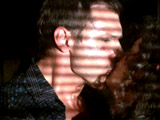   
|
|||||||||

|
Later in the film, when Deckard was stalking the replicants, he entered engineer Sebastian's workroom apartment, where replicant Pris (Daryl Hannah) was sitting stiffly poised and perfectly still under a veil to emulate the toy creations. When he carefully bent forward and removed her veil, she ferociously kicked him in the chest, sending him flying across the room. With acrobatic prowess, she turned complete flipping cartwheels towards him, and then landed squarely astraddle Deckard's shoulders. With her strong, muscled legs and thighs, she very nearly squeezed the life from him in a thigh-hold around his neck, and tried to twist his head off. She violently boxed both his ears three times. He was brought down to the ground - she attacked him a second time with another series of gymnastic cartwheels. In a grisly death scene, he shot a hole in her stomach. The first bullet sent her into a wall upside down, and she bloodily fell to the floor, screaming and writhing in agony, flailing her hands and feet in a series of seizures and convulsions as she desperately fought for life. The second and third bullets caused her body to arch up off the floor as she died. Arriving back at the apartment, another replicant named Roy Batty (Rutger Hauer) discovered Pris' dead body with her lifeless tongue protruding from her mouth. In a sensual, intimate farewell moment in the obliquely-cold film, a teary-eyed and grieved Roy sadly and soulfully kissed his dead lover's corpse and caressed her tongue. When he pulled away from her mouth, he repositioned her tongue within her mouth so that she didn't die looking like an animal. |
 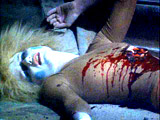   
|
|||||||||

|
Deathtrap (1982)
Sidney Lumet's twisting, intricate dark comedy thriller-parody (similar to Sleuth (1972)) contained a controversial and infamous gay-kissing scene (one of the film's convoluted plot twists) between two straight actors:
The kiss was one of the first openly-portrayed acts of homosexuality on screen. Reportedly, the producers claimed that a Time Magazine expose caused the film to lose a considerable amount of revenue ($10 million) due to negative publicity and spoiling the plot - therefore, the kiss was dubbed "the $10 Million Dollar Kiss." Christopher Reeve described the kiss: "We kiss on the mouth. We handle it straight on. But I hope that audiences will not over-focus on the homosexual aspects of a thriller." The words of Tom Smith's 2007 song: "Two Guys Kissin' (Ruined My Life)" referred to the film's plot:
|

|
|||||||||

|
Director Steven Spielberg's endearing and magical film about a lost outer-space creature stranded on Earth was one of the biggest hits of the early 1980s. The alien E.T. was befriended by 10 year-old Elliott (Henry Thomas) who lived in a surburban neighborhood. While alien E.T. watched the TV screen tuned to the famous love scene between John Wayne and Maureen O'Hara in John Ford's classic film The Quiet Man (1952) (see earlier entry), the actions and movements of the two film characters matched identical movements of Elliott (Henry Thomas) and the pretty blonde girl (young Erika Eleniak) in his school's biology classroom, during the 'save the frogs' sequence.
When John Wayne grabbed Maureen O'Hara as she went out the door and pulled her back into the cabin, Elliott pulled his classmate back into the classroom, and when the lovers kissed in the movie, Elliott quickened his nerve and kissed the pretty girl in his class, but first had to stand on the back of a male classmate in order to be the right height - E.T. smiled. The two large hands of Elliott's schoolteacher grabbed him and pulled him away from the young girl, who had been standing there with her eyes closed. |
||||||||||

|
In the tear-jerking ending, E.T. departed in his spaceship at the rendezvous site, where the hatch of the ship opened. It was a touching, farewell in the film's conclusion, in which E.T. left his earthbound friends. The scene was portrayed with awe, wonder, and amazement, especially when Elliott's younger sister Gertie (Drew Barrymore) bid E.T. goodbye and kissed his nose:
The friends of Elliott's older brother Michael (Robert MacNaughton) friends, Elliott's mother Mary (Dee Wallace-Stone), Keys (Peter Coyote), and Gertie watched as Elliott bid his friend goodbye. E.T. had brought all of them together to look on:
Then E.T. waddled up the spaceship's gangplank ramp with the potted geranium plant in his hands (a plant sample - the original object of his journey). He entered his "home" to depart from planet Earth, leaving a rainbow streak vapor trail in the sky as a symbol of his promise to Elliott that he would be "right here" in his thoughts and dreams. |
    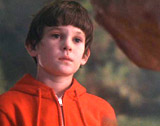
|
|||||||||
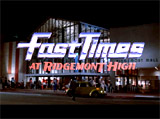
|
Fast Times at Ridgemont High (1982)
Director Amy Heckerling's superior 80s high-school coming-of-age sex comedy was originally rated X during the conservative early 1980s. It was the frank story of Southern California teens preoccupied by sex - with some scenes of unglamorous sex (especially for the female involved) and promiscuity. As they sunbathed together at the start of the film's most memorable daylight fantasy pool scene, sexually-liberated and experienced high-schooler Linda Barrett (Phoebe Cates) claimed to 15 year-old freshman friend Stacy Hamilton (Jennifer Jason Leigh) that she always climaxed with her older boyfriend Doug: "He's no high-school boy." When Stacy's brother, senior-year Brad Hamilton (Judge Reinhold) came home, he experienced a fantasy dream-girl view of Linda at poolside as he masturbated in the pool-side bathroom. In his mind, he saw sexually-liberated Linda emerging from the pool, speaking seductively: "Hi, Brad! You know how cute I always thought you were" before unhooking the middle of her bright red-bikini top in slow-motion as she walked over to him and toplessly kissed him (to the tune of The Cars' hit "Moving in Stereo"). In reality, however, she dove into the pool and embarrassingly interrupted his excitement by barging into the bathroom and catching him pleasuring himself ("Doesn't anybody f--king knock anymore?" he asked himself). The scene has regularly been voted as one of the sexiest scenes ever filmed in the 80s - and of all-time. |
   
|
|||||||||

|
Making Love (1982)
Director Arthur Hiller's bold breakthrough R-rated film with mainstream stars in a pre-AIDS era was significant as the first non-exploitative, gay-themed Hollywood film produced and marketed for a general audience - to address openly and directly the bi-sexual male character without vilification. However, it caused audiences extreme upset and discomfort at the time. LA doctor Zack (Michael Ontkean) left his loyal and intelligent wife Clair (Kate Jackson) after eight years of marriage for young homosexual writer Bart McGuire (Harry Hamlin). The film's controversial kissing scene was their passionate male tongue-kissing (a milestone for a major studio feature film). |
 
|
|||||||||

|
An Officer and a Gentleman (1982)
Taylor Hackford's R-rated romantic blockbuster (chick-flick) told about a rough but appealing love affair between:
When they first met at a sponsored officer's dance, they learned a little about their aspirations, and he complimented her with a kiss: "Paula, you are a very, very pretty girl." She kissed him back, and then innocently asked: "Do you want to go somewhere else?" They left the dance and were kissing outdoors when he suggested: "Let's go down to the beach." As their affair heated up, so did their kissing. Their relationship had its ups and down, especially when Zack became frustrated and angered - and closed up about his past, while she desired some kind of loving commitment:
After he comforted her and apologized, they spent the night together. The next morning, she challenged him: "I dare you not to fall in love with me. I mean, how can you resist? I'm like candy." He assured her: "You're better than candy." She replied: "It's going to be very hard to get enough. Very hard. Very hard." He called her a "little cocky Polack," and they fell to the floor and kissed. She asked:
Their relationship included a realistic and sexually explicit nude love scene, commencing with steamy kisses, in which she wriggled and straddled atop him and then eased herself off of him ("Bye, Zachary"). |
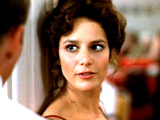 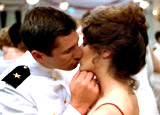   
|
|||||||||

|
An Officer and a Gentleman (1982)
In this film's rousing romantic finale (often considered cheesy and tearjerking), graduated naval trainee Zack Mayo (Richard Gere) walked through the paper factory and greeted surprised factory worker/lover Paula Pokrifki (Debra Winger) with a kiss on her neck - from behind. She turned around - startled. Then he planted a second kiss on her by grabbing her face and giving her a more intimate kiss. She placed her arms around his neck during the kiss, as he hoisted her up and spun her around. They kissed repeatedly. He grabbed her and carried her away to the exit while she was in his arms, as co-workers applauded and Paula's work friend Lynette Pomeroy (Lisa Blount) called out:
The film concluded in a freeze-frame after she placed his cap on her head, with the credits displayed to the tune of "Up Where We Belong." |
   
|
|||||||||

|
TRON (1982)
Director Steven Lisberger's ground-breaking sci-fi film featured Jeff Bridges in a dual role as both a genius computer software engineer (Kevin Flynn) and a computer "program" (named "Clu" (Codified Likeness Utility)) within a video game. [Note: Programs are electronic beings, created by users, that inhabit cyberspace.] Flynn had been fired from a computer software company named ENCOM, where he had worked with Alan Bradley (Bruce Boxleitner) and ex-girlfriend Lora Baines (Cindy Morgan) - who, like himself, would become characters in an alternate cyber-universe. He was desperate to prove that the hottest videogames from ENCOM were stolen ("annexed") from him by a malicious former co-worker named Ed Dillinger (David Warner), who had rapidly ascended and become a senior executive there. To help his friends, Flynn successfully hacked into the ENCOM 511 mainframe but found himself personally propelled into the digital world ("digitized) when zapped by a laser beam by the computer's controlling and malevolent Master Control Program (MCP) - he became trapped inside the electronic arena, a grid-lined, neon-glowing, 3-D pixelized world inside the evil corporation's mainframe where programs lived and worked. There, he teamed up with computer-generated super-hero "video game warrior" and security program named "Tron" (Bruce Boxleitner) to defeat the MCP. In the process of destroying it, he also saved Tron, while establishing a close relationship with "Yori" (Cindy Morgan), Tron's romantic interest. In the finale, Kevin made a resolution to jump suicidally and sacrificially into the energy beam of the Master Control Program to defeat it, and to save Tron. Yori reacted with aghast at Flynn's idea before the leap, but he was able to reassure her with a brief, but passionate kiss. As they kissed, a brilliant, multicolored, mostly reddish shaft of light emanated from the MCP behind them.
After the kiss, Flynn meaningfully gazed into Yori's eyes one last time and then jumped into the beam. His leap allowed him to take control long enough to give Tron the chance he needed to destroy the malicious program. Yori was reunited with Tron and repeated the kiss taught to her by Flynn, while Flynn was successfully transported back to the real world. |
    
|
|||||||||

|
Victor/Victoria (1982)
Director Blake Edwards' gender-bending screwball sex farce and musical comedy was about transvestism and often changing and ambiguous sexual identities, especially regarding Victoria Grant (Julie Andrews). She was a down-and-out unemployed soprano singer who became a sensation when she posed as a Polish gay-male female impersonator - as a woman, she pretended to be a gay-man (Victor) who on stage was pretending to be a woman (Victoria). She performed in Chez Lui, the club of witty gay night-club entertainer Carroll "Toddy" Todd (Robert Preston) in 1930s Paris, where he also pretended to be her gay lover, and 'she' was known as "Count Victor Grazinski." Mob-connected Chicago night club owner King Marchand (James Garner) found himself seriously attracted to cross-dressing Victoria. His interest heightened even after learning - at the conclusion of her act "Le Jazz Hot" - that "she" (Victoria) had revealed herself to be a "he" (Victor) ("It's a guy"). She removed her wig and presented herself as a man to the public. After a nightclub riot the next day, he escaped from police arrest with her. Hiding in a dark alley, the romantic attraction King felt towards Victoria finally came out. He exclaimed: "I don't care if you are a man," and impulsively kissed her. She breathed, "I-I'm... not a man," to which he replied: "I still don't care" and they kissed again, more passionately. |
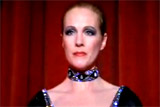 The Revelation 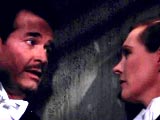   
|
|||||||||
(in chronological order by film title) Introduction | 1896-1925 | 1926-1927 | 1928-1932 | 1933-1936 | 1937-1939 | 1940-1941 1942-1943 | 1944-1946 | 1947-1951 | 1952-1954 | 1955 - 1 | 1955 - 2 | 1956-1958 | 1959-1961 1962-1965 | 1966-1968 | 1969-1971 | 1972-1976 | 1977-1981 | 1982 1983-1984 | 1985-1986 | 1987 | 1988 | 1989-1990 | 1991 | 1992-1993 | 1994 1995 | 1996 | 1997 | 1998 | 1999 | 2000 | 2001 | 2002 | 2003 | 2004 | 2005 | 2006-2007 | 2008 | 2009- |